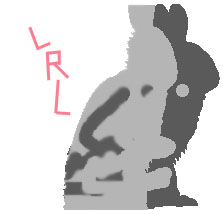
Victoria Hsieh
An error lost its ways and when it woke up was next to an absence. Certain patterns are meant to be fractured? Consider: a braid falls predictably to its fated tail, strands into a sprig, a disk into something linear. Curves tire of their rounded nature, turning out the label in the label outside. Some seams burst out of composure, a fracture overts the texture. Each convergence devious, tenuously positioned to stage another pin, cliff, split, oh I have been waiting so long for things to merge. There are so many ways to be wrong, and many fewer ways to be right. A disk that morphs until it reaches something like what we may call linear. I can know linear.
She says, I bit my tongue going through with this. Everything went the wrong way. I will explain afterwards.
It fell out of its form. This thing, the piece mis-stepped and came to be something other than itself. Its self that was to be my own. If it is not a willful creation of error (and who could bear willfully creating error?), then it must be between being: neither correctly correct nor correctly wrong. That is the highest compliment: a form of falling, in art. Before failure was glamorous, I waited and waited for my world to turn poetic. Sometimes I would think it was starting: a violet leaf, a certain beautiful wrinkle to be found in the sidewalk. There is much you cannot notice when things are done correctly—everything turns into a shape of formal production. Even an error of omission transforms into just something else that’s there.
Lost, absent. It just wanted to find its way. I may as well have ordered a tree not to sway in the wind.
Maybe your path erupts and suddenly you’re between too. Will this make things merge? The uncertain leaves a certain sour taste in my mouth. Can’t it at least be postponed for when I am ready? And finally, only art would have enough time for this silliness. The artist is the first one subject to its falling off of itself. There can be neither inoculation nor understanding. Falls are sometimes delightful—there was that fall you leapt into after you spun and spun and spun. A comb, a ruler, a narrow empty road where new desire once was. Maybe it is not any easier for her, is all I’m saying. It was never any thing, anyway. This, this that is all that can be found.__________
Victoria Hsieh is currently a graduate student in Comparative Literature at the University of California, Irvine. She works on contemporary poetry, theories of postcoloniality, and issues of cultural comparison.